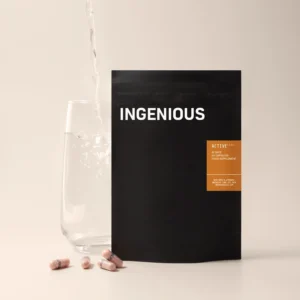VITAMIN E
what is Vitamin e?
Vitamin E is an essential nutrient as it cannot be synthesised in our bodies and must be provided in the diet. It helps repair cells and is essential for the immune system to function properly. Vitamin E is fat soluble, so your body is able to store it and use it when it needs to.
why is Vitamin E important?
Vitamin E is known to act as an antioxidant protecting cells, particularly cell membranes, against damage. This helps to maintain healthy skin and eyes and is thought to reduce the risk of age-related eyesight problems, such as macular degeneration. There is evidence that it plays a role in the growth of smooth muscles, helping to maintain skeletal structural, strength, and function. Vitamin E is also thought to play a role in the formation of red blood cells, helping to maintain the correct levels of vitamin A and vitamin K in the blood. There is also research to suggest that vitamin E acts as a painkiller, reducing symptoms of period pain, other PMS symptoms, and pain from inflamed joints.
how does vitamin e protect the skin?
Vitamin E contributes to good skin health by:
- Preventing signs of ageing by fighting free radicals
- Absorbing UVB light which causes skin to burn and age
- Protecting cell membranes, keeping them hydrated and healthy
what is the right amount of vitamin e?
For adults, the recommended daily amount for vitamin E is 12mg per day. People are advised to eat a healthy, varied diet to ensure they receive a good balance of vitamins and minerals. For example a single cup of cooked spinach contains about 4mg of vitamin E, which is a third of the recommended daily intake. Not everyone manages to get their full allowance of vitamin E from food everyday, so topping up your levels with a supplement can help. Both Vegan+ and Active contain 4mg of vitamin E.
what foods contain vitamin e?
High sources of vitamin E can be found in:
- Avocados, tomatoes, sweet potatoes, spinach, watercress and brussel sprouts
- Blackberries and mangoes
- Corn oil, olive oil, safflower oil and sunflower oil
- Mackerel and salmon
- Nuts, whole meal and whole grain products



